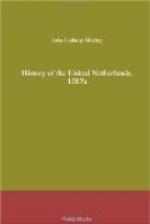At last, very late in January, one Hugh Overing, a haberdasher from Ludgate Hill, was caught at Rotterdam, on his way to Ireland, with a bundle of letters from Sir William Stanley, and was sent, as a suspicious character, to the state-council at the Hague. On the same day, another Englishman, a small youth, “well-favoured,” rejoicing in a “very little red beard, and in very ragged clothes,” unknown by name; but ascertained to be in the service of Roland York and to have been the bearer of letters to Brussels, also passed through Rotterdam. By connivance of the innkeeper, one Joyce, also an Englishman, he succeeded in making his escape. The information contained in the letters thus intercepted was important, but it came too late, even if then the state-council could have acted without giving mortal offence to Elizabeth and to Leicester.
On the evening of 28th January (N. S.), Sir William Stanley entertained the magistrates of Deventer at a splendid banquet. There was free conversation at table concerning the idle suspicions which had been rife in the Provinces as to his good intentions and the censures which had been cast upon him for the repressive measures which he had thought necessary to adopt for the security of the city. He took that occasion to assure his guests that the Queen of England had not a more loyal subject than himself, nor the Netherlands a more devoted friend. The company expressed themselves fully restored to confidence in his character and purposes, and the burgomasters, having exchanged pledges of faith and friendship with the commandant in flowing goblets, went home comfortably to bed, highly pleased with their noble entertainer and with themselves.
Very late that same night, Stanley placed three hundred of his wild Irish in the Noorenberg tower, a large white structure which commanded the Zutphen gate, and sent bodies of chosen troops to surprise all the burgher-guards at their respective stations. Strong pickets of cavalry were also placed in all the principal thoroughfares of the city. At three o’clock in the following morning he told his officers that he was about to leave Deventer for a few hours, in order to bring in some reinforcements for which he had sent, as he had felt much anxiety for some time past as to the disposition of the burghers. His officers, honest Englishmen, suspecting no evil and having confidence in their chief, saw nothing strange in this proceeding, and Sir William rode deliberately out of Zutphen. After he had been absent an hour or two, the clatter of hoofs and the tramp of infantry was heard without, and presently the commandant returned, followed by a thousand musketeers and three or four hundred troopers. It was still pitch dark; but, dimly lighted by torches, small detachments of the fresh troops picked their way through the black narrow streets, while the main body poured at once upon the Brink, or great square. Here, quietly and swiftly, they were marshalled into order, the cavalry, pikemen, and musketeers, lining all sides of the place, and a chosen band—among whom stood Sir William Stanley, on foot, and an officer of high rank on horseback—occupying the central space immediately in front of the town-house.




